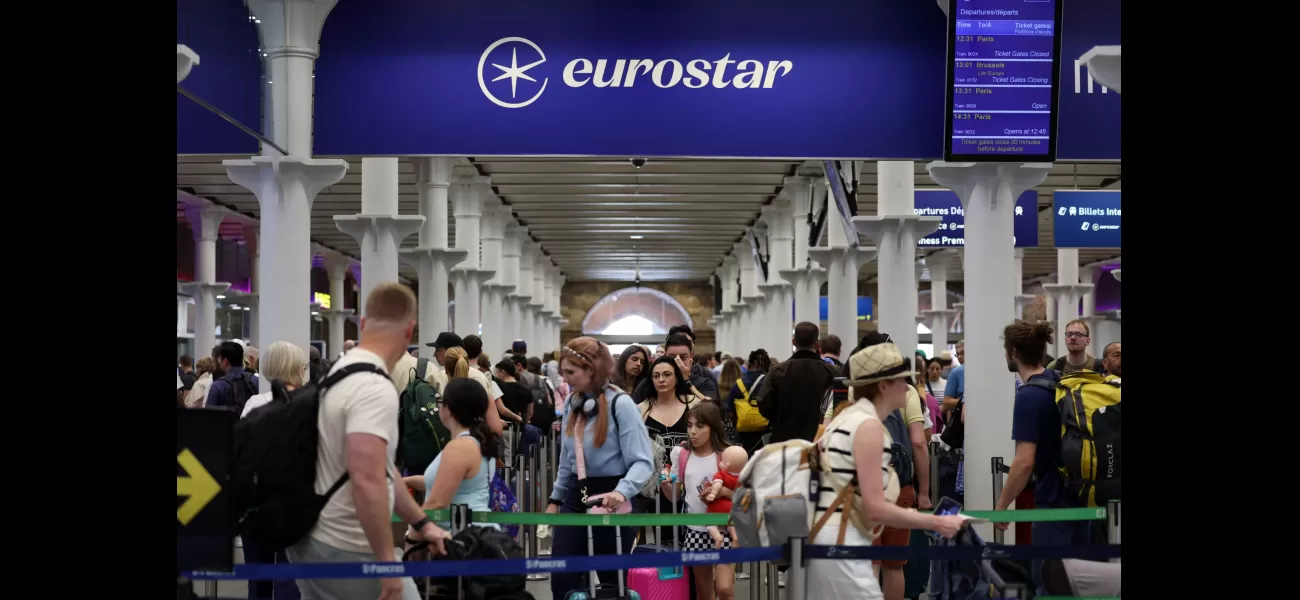Eurostar train services between France and UK are facing severe disruptions due to arson attacks and security concerns at the French border.
France felt vulnerable before the Paris Olympics, almost as if it was being targeted.
July 27th 2024.

As the Olympic Games in Paris approached, it seemed as though France was under attack. The Eurostar rail terminal at St Pancras International station in London was bustling with passengers, ready to embark on their journey to Paris. However, things took a turn for the worse as news of Russian sabotage spread. France's entire rail network was brought to a standstill, leaving over 800,000 passengers stranded. Eurostar trains were cancelled, and chaos ensued.
The situation was so dire that it felt as though the country was under siege. As the world was distracted by the spectacular performance by Celine Dion at the Opening Ceremony along the River Seine, grave issues were brewing in the hours leading up to it. Arson attacks targeted the "nerve centres" of French railways, causing widespread disruption to train lines across the country. This included the Eurostar, which connects London to Paris.
In total, over 800,000 passengers were affected by the attacks. Bomb threats added to the chaos, causing French police to race from one side of the city to the other. This all occurred just 48 hours after a Russian reality TV chef, Kirill Gryaznov, was arrested in Paris for allegedly plotting to cause mayhem at the Olympics. It was a tumultuous time for the city, and many were left wondering what exactly was happening in the days leading up to the Games.
In the midst of all the chaos, The Agency's live blog provided the latest updates on the 2024 Olympic Games. But for those who were directly impacted by the attacks, the question on everyone's mind was: what happened to the trains in France?
In the early hours of the morning, a series of attacks were carried out across the country, targeting the state-owned rail company SNCF. Explosive devices were set off, causing fires on the signalling infrastructure of three lines that lead into Paris. This affected train services from cities such as Lille, Bordeaux, and Strasbourg. The disruptions were most severe at Gare Montparnasse in Paris, where hundreds of people were left stranded.
SNCF warned that delays and cancellations would continue over the weekend as engineers worked tirelessly to repair the damage caused by the fires. Despite their efforts, services were still not fully back to normal by Saturday morning.
As for who was responsible for the attacks, it was a mystery that remained unsolved for over 24 hours. French Prime Minister Gabriel Attal cautioned against speculation, stating that it was too early to determine the culprit. However, he did acknowledge that the attacks were coordinated and targeted specific "nerve centres" of the rail network, suggesting that the perpetrators had a good understanding of the system.
The Paris prosecutor's office launched an investigation, with the anti-terrorist sub-directorate overseeing the case. This branch of the judicial police typically monitors far-left, far-right, and radical environmental groups. These attacks raised concerns about security gaps in the country, and the possibility of a larger threat looming.
NATO Secretary-General Jens Stoltenberg had previously warned of similar sabotage attempts by Russia, but there was no evidence to suggest that they were behind these attacks. As the chaos continued, many wondered what would happen to those who were impacted by the disruptions.
In total, over 800,000 people were affected, including Eurostar passengers. The SNCF urged customers not to travel to the station on Friday morning as most trains were cancelled or delayed. Eurostar also had to cancel a quarter of its services and advised passengers to postpone their travels if possible. Those who were directly affected had the option to change their booking, cancel for an e-voucher, or receive a full refund.
Kirill Gryaznov, the 40-year-old former Russian reality TV chef, was identified as the suspected spy behind the plot to destabilize the Olympics. He was arrested in Paris after a raid on his apartment, where French authorities found evidence linking him to an elite special operations unit under the command of Russia's FSB security service. This raised concerns about his intentions and the potential for further disruptions during the Games.
Gryaznov had been closely monitored by multiple European intelligence agencies in the months leading up to his arrest. It was discovered that he had participated in the Russian version of "The Bachelor" before moving to Paris 14 years ago. He even trained as a chef at the prestigious culinary school, Le Cordon Bleu. Despite his seemingly normal life, he had over 11,000 followers on Instagram, where he shared professional photographs of his dishes.
As the chaos in Paris continued, Eurostar's teams were working tirelessly to assist and inform passengers. Due to the coordinated attacks, all high-speed trains going to and from Paris were diverted, causing delays of up to an hour and a half. Despite the challenges, the team remained committed to keeping passengers informed and safe.
The situation was so dire that it felt as though the country was under siege. As the world was distracted by the spectacular performance by Celine Dion at the Opening Ceremony along the River Seine, grave issues were brewing in the hours leading up to it. Arson attacks targeted the "nerve centres" of French railways, causing widespread disruption to train lines across the country. This included the Eurostar, which connects London to Paris.
In total, over 800,000 passengers were affected by the attacks. Bomb threats added to the chaos, causing French police to race from one side of the city to the other. This all occurred just 48 hours after a Russian reality TV chef, Kirill Gryaznov, was arrested in Paris for allegedly plotting to cause mayhem at the Olympics. It was a tumultuous time for the city, and many were left wondering what exactly was happening in the days leading up to the Games.
In the midst of all the chaos, The Agency's live blog provided the latest updates on the 2024 Olympic Games. But for those who were directly impacted by the attacks, the question on everyone's mind was: what happened to the trains in France?
In the early hours of the morning, a series of attacks were carried out across the country, targeting the state-owned rail company SNCF. Explosive devices were set off, causing fires on the signalling infrastructure of three lines that lead into Paris. This affected train services from cities such as Lille, Bordeaux, and Strasbourg. The disruptions were most severe at Gare Montparnasse in Paris, where hundreds of people were left stranded.
SNCF warned that delays and cancellations would continue over the weekend as engineers worked tirelessly to repair the damage caused by the fires. Despite their efforts, services were still not fully back to normal by Saturday morning.
As for who was responsible for the attacks, it was a mystery that remained unsolved for over 24 hours. French Prime Minister Gabriel Attal cautioned against speculation, stating that it was too early to determine the culprit. However, he did acknowledge that the attacks were coordinated and targeted specific "nerve centres" of the rail network, suggesting that the perpetrators had a good understanding of the system.
The Paris prosecutor's office launched an investigation, with the anti-terrorist sub-directorate overseeing the case. This branch of the judicial police typically monitors far-left, far-right, and radical environmental groups. These attacks raised concerns about security gaps in the country, and the possibility of a larger threat looming.
NATO Secretary-General Jens Stoltenberg had previously warned of similar sabotage attempts by Russia, but there was no evidence to suggest that they were behind these attacks. As the chaos continued, many wondered what would happen to those who were impacted by the disruptions.
In total, over 800,000 people were affected, including Eurostar passengers. The SNCF urged customers not to travel to the station on Friday morning as most trains were cancelled or delayed. Eurostar also had to cancel a quarter of its services and advised passengers to postpone their travels if possible. Those who were directly affected had the option to change their booking, cancel for an e-voucher, or receive a full refund.
Kirill Gryaznov, the 40-year-old former Russian reality TV chef, was identified as the suspected spy behind the plot to destabilize the Olympics. He was arrested in Paris after a raid on his apartment, where French authorities found evidence linking him to an elite special operations unit under the command of Russia's FSB security service. This raised concerns about his intentions and the potential for further disruptions during the Games.
Gryaznov had been closely monitored by multiple European intelligence agencies in the months leading up to his arrest. It was discovered that he had participated in the Russian version of "The Bachelor" before moving to Paris 14 years ago. He even trained as a chef at the prestigious culinary school, Le Cordon Bleu. Despite his seemingly normal life, he had over 11,000 followers on Instagram, where he shared professional photographs of his dishes.
As the chaos in Paris continued, Eurostar's teams were working tirelessly to assist and inform passengers. Due to the coordinated attacks, all high-speed trains going to and from Paris were diverted, causing delays of up to an hour and a half. Despite the challenges, the team remained committed to keeping passengers informed and safe.
[This article has been trending online recently and has been generated with AI. Your feed is customized.]
[Generative AI is experimental.]
0
0
Submit Comment





